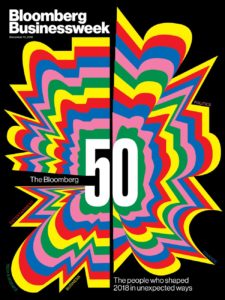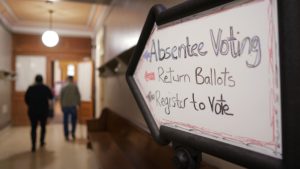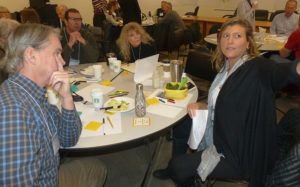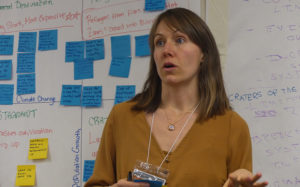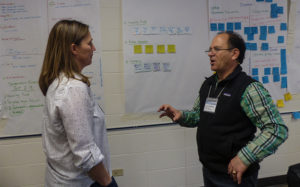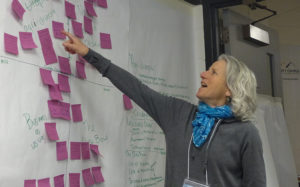Icons & Innovators
December 6, 2018The Bloomberg 50 “lists the icons and innovators who’ve changed the global business landscape in measurable ways over the past year.” Here are the politics honorees:
- Chef José Andrés, founder of World Central Kitchen
- Britain’s Gavin Barwell, chief of staff to Prime Minister Theresa May
- California Attorney General Xavier Becerra
- Canadian Foreign Minister Chrystia Freeland
- China’s Liu He
- Patagonia CEO Rose Marcario
- White House’s Mick Mulvaney, acting director of Consumer Financial Protection Bureau
- The new populists (Mexican President Andrés Manuel López Obrador, Malaysian Prime Minister Mahathir Mohamad, South African President Cyril Ramaphosa, Ethiopian Prime Minister Abiy Ahmed.)
- Rep.-elect Alexandria Ocasio-Cortez (D-N.Y.)
- The Parkland activists
- Sen. Tim Scott (R-S.C.)
- The Time’s Up Legal Defense Fund founders (Tina Tchen,Roberta Kaplan, Hilary Rosen, and Fatima Goss Graves)
Local journalism.
The Charlotte Observer’s reporting on election fraud is indicative of our need for local journalism, investigative reporting…specifically newspapers…and the role of the 4th Estate, a free press.
NC election scandal probe focuses on Charlotte-area political consultant
https://www.charlotteobserver.com/news/politics-government/election/article222690460.html
In response to “At center of voter fraud scandal, a convicted felon and ‘grassroots’ campaigner” :
It looks like the electoral fraud we’ve been searching for the past few years has been found in Bladen County. But as it turns out, it has nothing to do with non-citizens voting, someone hacking the voting machines or people impersonating other voters because NC doesn’t require ID.
Assuming the evidence holds up, the real problem is old-fashioned vote theft happening in razor-close elections and carried out by people getting paid out of a candidate’s campaign funds. It’s the real thing, and it has nothing to do with voter ID.
Photo: Gregory Rec/Portland Press Herald via Getty Images
The McClatchy Company is a publicly traded American publishing company based in Sacramento, California, and incorporated in Delaware.[2] It operates 29 daily newspapers in fourteen states and has an average weekday circulation of 1.6 million and Sunday circulation of 2.4 million. [wikipedia]
As ubiquitous as connectivity may seem for those who live in cities or suburbs with comfortable incomes, here’s the reality:
- Less than one-fifth of Americans live in a neighborhood where at least 80% of the residents have broadband, according to a report last year from the Brookings Institution.
- Nearly one-in-five teens are sometimes unable to complete homework because of lack of a reliable computer or internet connection, per Pew.
- Local news and information is becoming scarce and hard to access: More than 500 newspapers have closed or merged in rural communities since 2004.
The big picture: There are two types of “digital divide” operating today:
- The geographic divide: Rural and other areas are underserved because it doesn’t make financial sense for companies to invest in infrastructure.
- The economic divide: Infrastructure is in place, but lower-income families lack affordable access and devices.
Why it matters: These divides are colliding and combining in troubling ways — and creating a whole spectrum of education, information and privacy inequality.

The media haves and have nots.
- A record number of newspaper sales and closures/mergersvia the seven biggest newspaper investment owners have increased over the past five years.
- Only 17% of local news stories in a community are actually local, meaning they’re about or having taken place within a municipality, per a study from Duke earlier this year.
- While more people say they are willing to pay for news, those with higher levels of education are more likely to do so, per a study from the American Press Institute.
Between the lines: Benson says finding ways to create a plurality in types of news ownership will help to decrease the growing information gap in the U.S.
The bottom line: There’s a real news and information divide between rural and urban/suburban communities as well as between the poor and rich in the United States.
“Increasingly, journalism serves as a powerful force for exclusion, for keeping quality information away from those who need it most, for discouraging anyone but the richest, most educated citizens from participating in the public conversation.”— Rodney Benson, chair of NYU’s Department of Media Culture, and Communication
Digital Divide.
As ubiquitous as connectivity may seem for those who live in cities or suburbs with comfortable incomes, here’s the reality:
- Less than one-fifth of Americans live in a neighborhood where at least 80% of the residents have broadband, according to a report last year from the Brookings Institution.
- Nearly one-in-five teens are sometimes unable to complete homework because of lack of a reliable computer or internet connection, per Pew.
- Local news and information is becoming scarce and hard to access: More than 500 newspapers have closed or merged in rural communities since 2004.
The big picture: There are two types of “digital divide” operating today:
- The geographic divide: Rural and other areas are underserved because it doesn’t make financial sense for companies to invest in infrastructure.
- The economic divide: Infrastructure is in place, but lower-income families lack affordable access and devices.
Why it matters: These divides are colliding and combining in troubling ways — and creating a whole spectrum of education, information and privacy inequality.
Media pivots away from advertising
For decades the primary source of revenue for media companies was advertising. But competition from technology companies and more privacy scrutiny are pushing most media companies to explore alternative forms of revenue, Axios’ Sara Fischer reports.
- Why it matters: Most media companies have to unwind years worth of sales and product infrastructure to make way for the transition. Not all will survive.
Most companies are looking for creative ways monetize their owned and operated channels and content, but the transition away from advertising and Facebook traffic has been difficult.
- Subscriptions and memberships: Bloomberg, Vanity Fair, Wired, Business Insider, Quartz, New York Magazine, The Atlantic, The Daily Beast, HuffPost
- Commerce: BuzzFeed, CNN, New York Times, NBC
- Content licensing deals: Vox, New York Times, BuzzFeed, Axios, Refinery29, Conde Nast Entertainment
- Technology licensing deals: The Washington Post (Arc), New York Magazine (Clay), Vox Media (Chorus), Hearst (MediaOS)
Be smart: Most companies are in the experimental phase, and haven’t yet figured out what their long-term strategy for growth will be — if there is one.
Blaine County Community Resilience Workshop: Climate Change
Aimee Christensen led a group looking at energy scenarios.
Journalist Karen Bossick published an in-depth exposé today [12.6] on Blaine County’s 1st Community Resilience Workshop. Our valley is the first in Idaho to begin planning for climate changes and the effects those changes will, and are, having in our community, e.g., wild fires, energy sources, food, jobs, and housing. Blaine County Commissioner Larry Schoen: “We’re setting the stage not only for our own action but for other communities to follow our lead.” A second workshop is scheduled for February to begin pursuing concrete actions. The workshop was initiated by the Blaine County Commissioners and organized by the Sun Valley Institute.
Eye On Sun Valley, Story & Photos by Karen Bossick
Brittany Skelton, senior planner for the City of Ketchum, addresses such scenarios where the county might have to kick squatters out of national forest land.
Sawtooth National Forest official Bobbi Filbert and Blaine County Commissioner Jacob Greenberg discuss possible scenarios involving climate refugees.
Hailey City Council Member Kaz Thea points out the need for increased agricultural diversity in the Wood River Valley.
“We’re traveling 10 years into the future so we can move from fear and concern into hope and action,” said Amber Bieg, a facilitator with the Boise-based Warm Springs Consulting.
Holiday Love.
“Many of us are longing to experience a season of joy, but we feel winter’s darkness spreading in the midst of relentless violence, cruelty, and dehumanization. Here at the Revolutionary Love Project, we believe that if we pause to breathe together, we can find wisdom, even joy, inside the struggle.
This holiday season, we are excited to offer you a short series of video conversations with thought leaders in our movement who offer deep wisdom — Parker Palmer, America Ferrera, Sharon Brous, Traci Blackmon and more.
Here is your first gem! A conversation with author, activist, teacher and luminary Parker Palmer and our founder Valarie Kaur at Middle Church’s 2018 Revolutionary Love Conference. Parker and Valarie have developed a remarkable intergenerational friendship: He offers her insights drawn from decades of experience; she inspires him with a next-generation vision of fighting for justice. In the course of their friendship, Parker has come to call Valarie’s framework for Revolutionary Love “the new non-violence.”
Watch their conversation before a live audience as they reflect on life and death and love.”
http://valariekaur.com/2018/12/wisdom-parker-palmer-holiday-treasure-chest#video
Panama Papers Fallout Continues
The first criminal charges relating to ICIJ’s 2016 investigation, the Panama Papers, have been filed in the United States. Four men were charged with money laundering and fraud.
“These defendants went to extraordinary lengths to circumvent U.S. tax laws in order to maintain their wealth and the wealth of their clients,” said U.S. Attorney Geoffrey S. Berman. There is plenty of detail for those who want it in the department’s indictment.
The Panama Papers investigation was based on a trove of 11.5 million files from inside Mossack Fonseca that were leaked to reporters Bastian Obermayer and Frederik Obermaier at German newspaper Süddeutsche Zeitung, and shared with ICIJ. The investigation, done in collaboration with more than 370 reporters working for 100 media outlets, exposed the offshore holdings of world political leaders, links to global scandals, and details of the hidden financial dealings of fraudsters, drug traffickers, billionaires, celebrities, sports stars and more.
The Guardian
Meryl Streep will take the lead in The Laundromat, a Steven Soderbergh-directed thriller about the Panama Papers.
According to the Hollywood Reporter, the Oscar winner will potentially star alongside Gary Oldman and Antonio Banderas, who are both in early talks to join, in the fact-based tale. The Panama Papers was a set of leaked documents that shared financial information of offshore entities, revealing fraud, tax evasion and attempts to avoid international sanctions.
The film will be based on Secrecy World: Inside the Panama Papers Investigation of Illicit Money Networks and the Global Elite, a book by journalist Jake Bernstein. It will be adapted by Scott Z Burns, a frequent Soderbergh collaborator whose credits include Contagion and Side Effects.
https://www.theguardian.com/film/2018/may/14/meryl-streep-steven-soderbergh-panama-papers-thriller
